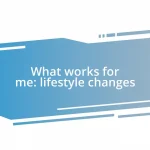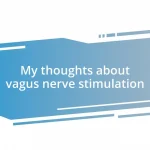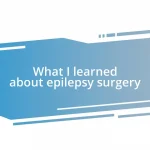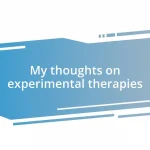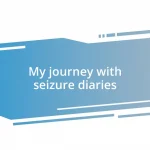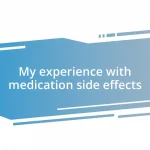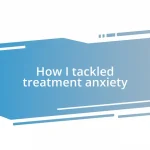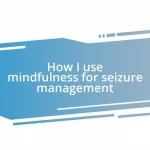Key takeaways:
- Experimental therapies represent innovative treatment options, especially when traditional methods fail, but come with significant risks and uncertainties.
- Benefits include access to novel treatments, personalized medicine, and the fostering of supportive patient communities.
- Careful consideration of a therapy’s mechanism, the credibility of research institutions, and accessibility are crucial when selecting experimental therapies.
- The future trends in experimental therapies focus on personalized medicine, the integration of technology, and increased patient involvement in research initiatives.
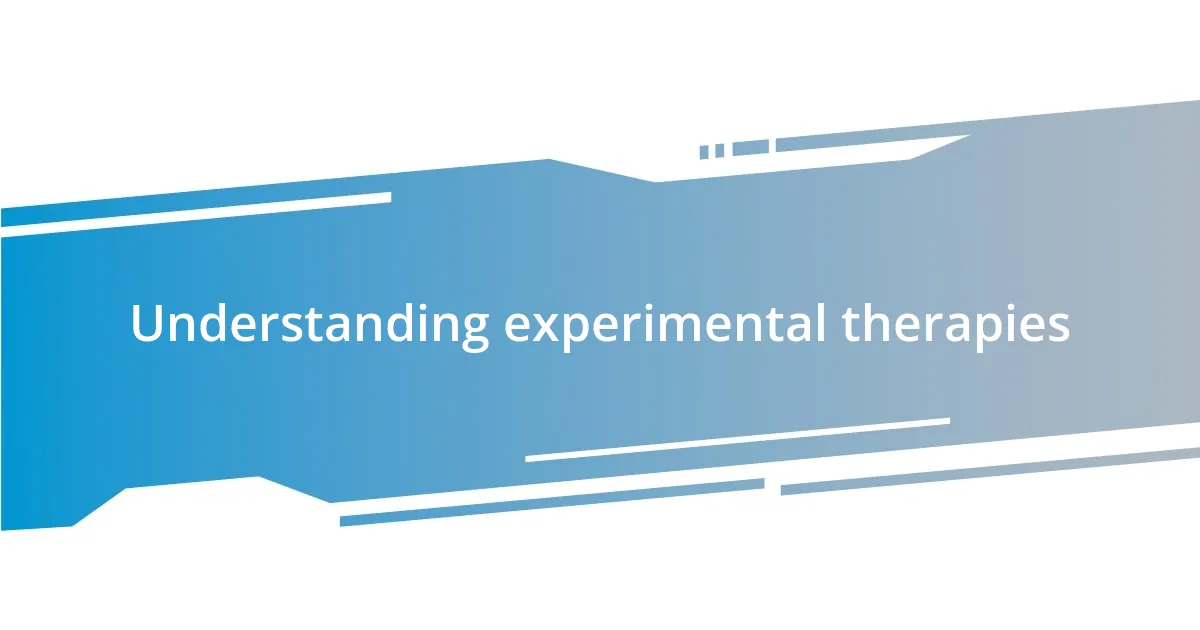
Understanding experimental therapies
Experimental therapies often represent the frontier of medical science, where traditional treatments may fall short. I remember attending a seminar where a specialist passionately described a groundbreaking gene therapy. His enthusiasm was infectious, leaving me pondering: what if such innovations could change the lives of millions suffering from chronic conditions?
What stands out to me is the uncertainty that often surrounds these therapies. Patients sometimes feel a mix of hope and trepidation. Are we chasing miracles, or are we fighting a losing battle against our own biology? Personally, I’ve seen friends navigating these murky waters, weighing their options and making heart-wrenching choices about their health.
It’s important for us to recognize that experimental therapies can come with risks, but they also offer new pathways when conventional treatments fail. I’ve spoken with patients who participated in clinical trials, and their stories are both inspiring and sobering. They remind me that behind every research study is a human desire for healing and a better quality of life.
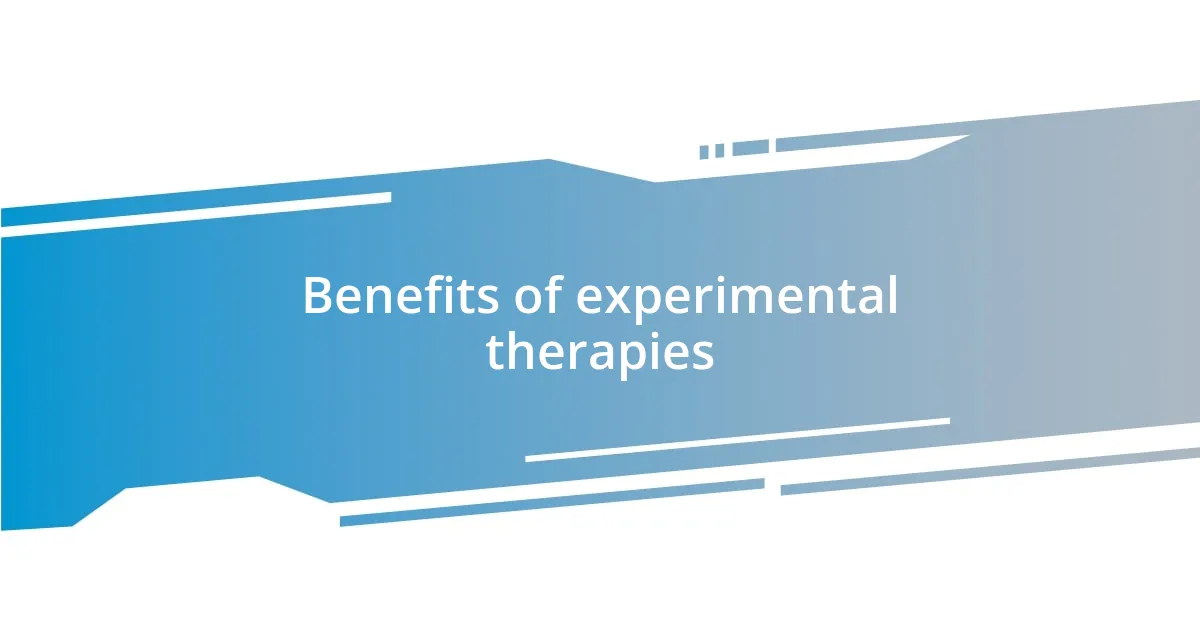
Benefits of experimental therapies
The benefits of experimental therapies can be profound, particularly for those who feel they’ve exhausted all conventional options. I recall chatting with a family member who had been battling a rare disease. After enrolling in an experimental trial, they experienced improvements that seemed almost miraculous. Their experience highlighted how these therapies can sometimes provide access to cutting-edge treatments that might not otherwise be available, igniting hope in the midst of despair.
- Access to novel treatments: Patients often gain earlier access to therapies that might become standard in the future.
- Personalized medicine: Many experimental therapies are tailored to individual genetic profiles, providing a bespoke path to healing.
- Potential for significant improvement: For some, these therapies can lead to major breakthroughs, improving symptoms when others have failed.
- Contributing to medical knowledge: Participating in trials helps to further research, potentially benefiting future patients.
- Community and support: Engaging in these therapies often connects patients with others in similar situations, forging a supportive community of shared experiences and hope.
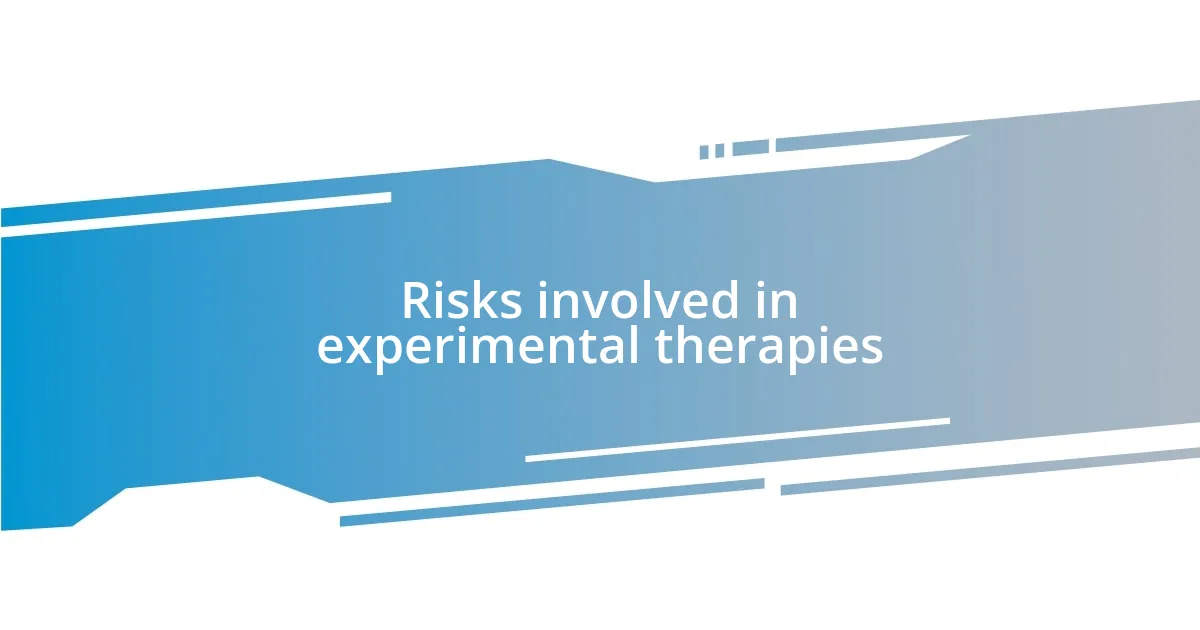
Risks involved in experimental therapies
The risks involved in experimental therapies can be quite significant. I remember discussing this with a friend whose family member participated in a trial for a new cancer treatment. They experienced severe side effects that weren’t fully communicated prior to enrollment. This taught me the importance of transparency in clinical trials, as unanticipated outcomes can lead to devastating results for patients.
Moreover, the lack of long-term data makes it difficult to assess the safety of many experimental therapies. When I think about the pressure to find a cure, I can see how patients might overlook this critical detail. I once met a woman who was excited about a new therapy for multiple sclerosis, only to later discover that long-term effects were still unknown. It’s a stark reminder that hope should always be tempered with caution.
Finally, there’s the emotional toll that comes with the uncertainty of outcomes. Participating in experimental therapies can feel like a rollercoaster ride. I’ve seen both joy and despair in patients, as they oscillate between optimism and disappointment. This struggle is often overlooked, but it shapes the patient experience and their journey through the unknown.
| Risk Type | Description |
|---|---|
| Side Effects | Unanticipated adverse reactions that can occur. |
| Long-term Safety | Insufficient data on long-term effects and efficacy. |
| Emotional Impact | Uncertainty can create significant emotional distress. |
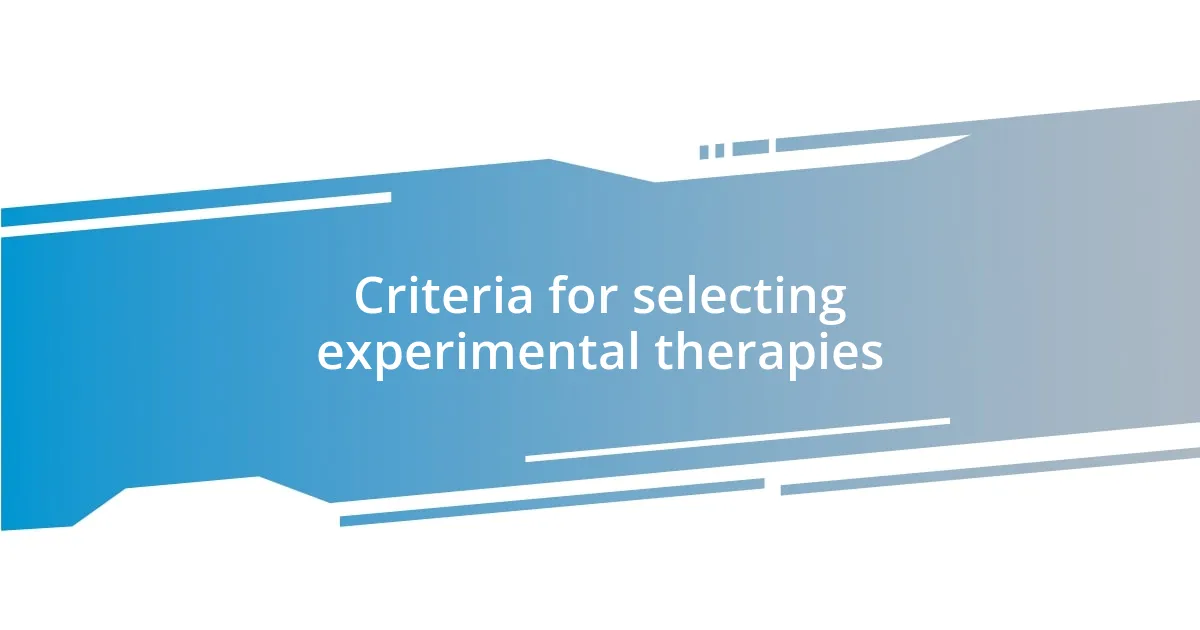
Criteria for selecting experimental therapies
When considering experimental therapies, one of the first criteria should be the therapy’s mechanism of action. Personally, I’ve found that understanding how a treatment works increases my confidence in it. For instance, when my uncle participated in a trial for a targeted therapy in lung cancer, knowing it was based on his specific genetic mutations made the whole process feel more relevant and less like a shot in the dark.
Another crucial factor is the credibility of the research and the institution conducting the trials. I’ve often wondered what distinguishes reputable trials from those that may not prioritize patient safety. In a conversation with a researcher at a renowned cancer center, I learned how rigorous peer reviews and ethical oversight contribute to trustworthy studies. This insight taught me that robust research environments significantly enhance the odds of success and safety for participants.
Finally, accessibility shouldn’t be overlooked. I vividly remember a friend who was eager to join an experimental therapy but faced logistical challenges that ultimately prevented her participation. Reflecting on her experience made me realize that even the most promising therapies can be rendered irrelevant if patients can’t easily access them. It prompts us to ask: How can we encourage participation in trials to ensure a wider reach for these innovative treatments? This consideration is vital for making strides in medical advancements.
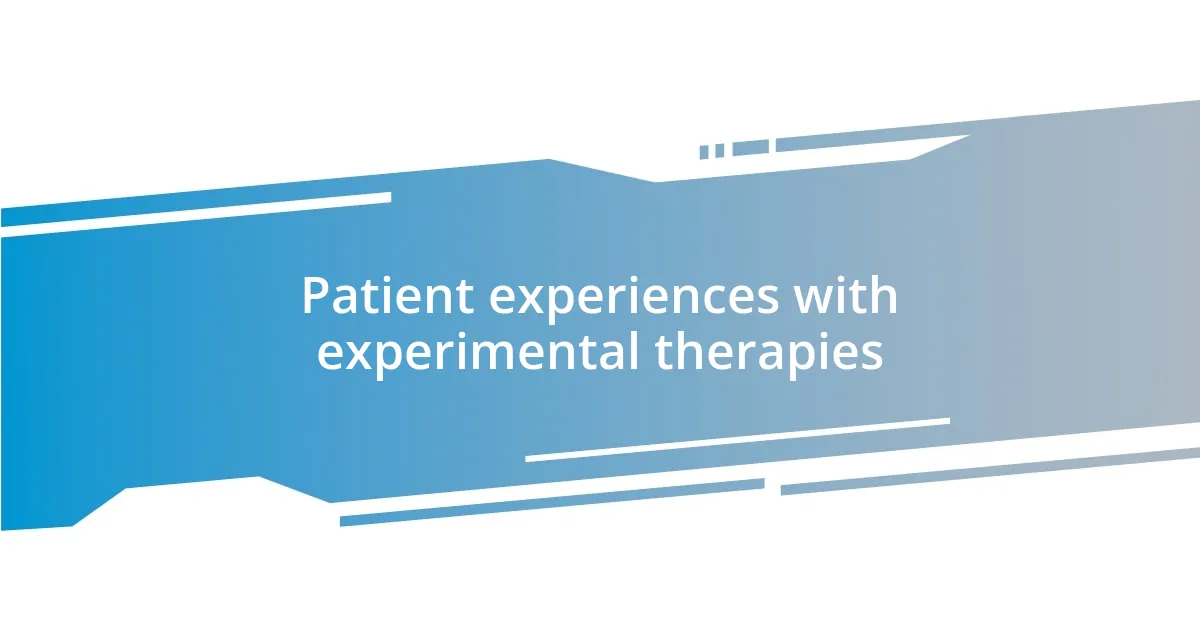
Patient experiences with experimental therapies
Patient experiences with experimental therapies are often layered with a mix of hope and apprehension. I remember speaking to a man who enrolled in a trial for a new diabetes treatment. He shared how he felt like a pioneer in medical research, yet there was a constant worry gnawing at him—what if the therapy didn’t work? This blend of excitement and fear is something I find recurring among patients. It’s a delicate balance that can weigh heavily on one’s mental state.
I’ve also encountered individuals who felt like they were part of a community through these trials. A woman I met at a support group described the bonds she formed with fellow participants, each of them navigating their unique challenges together. They shared not only information but also emotional support, which transformed the often isolating journey of illness into a shared experience. It made me realize how essential this connection is in facing the uncertainties of experimental therapies.
However, not all experiences are filled with camaraderie. I recall a heartbreaking story from a close friend who watched her mother try an untested therapy for Alzheimer’s. The initial hopeful signs faded, leading to frustration and despair as her mother gradually lost her ability to engage with those around her. This raises a critical question: how do we find the balance between hope and reality in experimental treatments? In my view, sharing and learning from these patient experiences can help foster a more informed and empathetic environment for those considering such therapies.
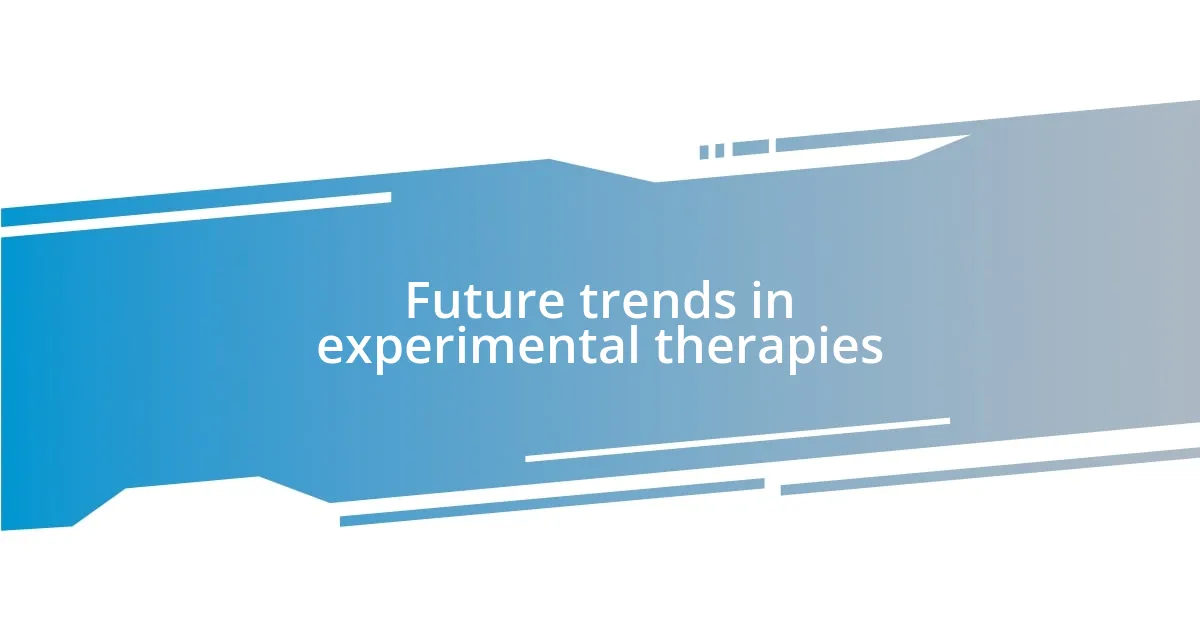
Future trends in experimental therapies
The future of experimental therapies seems promising, particularly with the rise of personalized medicine. I recall a conversation with a geneticist who passionately spoke about how advances in genomics could tailor treatments to an individual’s unique DNA profile. Imagine a world where therapies aren’t just one-size-fits-all but customized like a bespoke suit—this could drastically increase effectiveness and minimize side effects.
Another exciting trend is the integration of technology and artificial intelligence in clinical trials. I remember being fascinated by a demo of a platform that uses AI to analyze data from ongoing trials. This not only accelerates the identification of potential therapies but also improves patient recruitment and monitoring. It makes me wonder: could technology finally bridge the gap between groundbreaking discoveries and timely patient access?
Moreover, the growing trend of patient-driven research is reshaping the landscape of experimental therapies. Some of my friends have taken to social media to advocate for specific trials, sharing their stories and encouraging others to get involved. This grassroots movement empowers patients, reminding me that their voices are just as crucial as the scientists’ in shaping the future of healthcare. Are we entering an era where patient experiences can influence research priorities? The potential for collaboration between patients and researchers is something I find incredibly inspiring.
